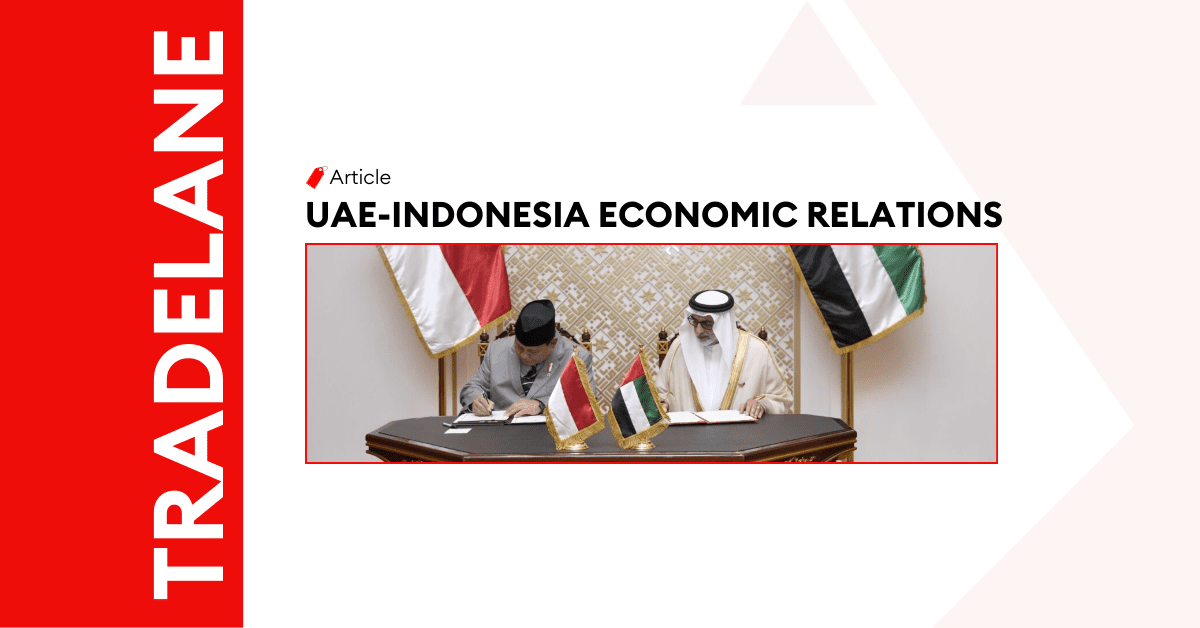
Exploring the Booming UAE-Indonesia Economic Relations
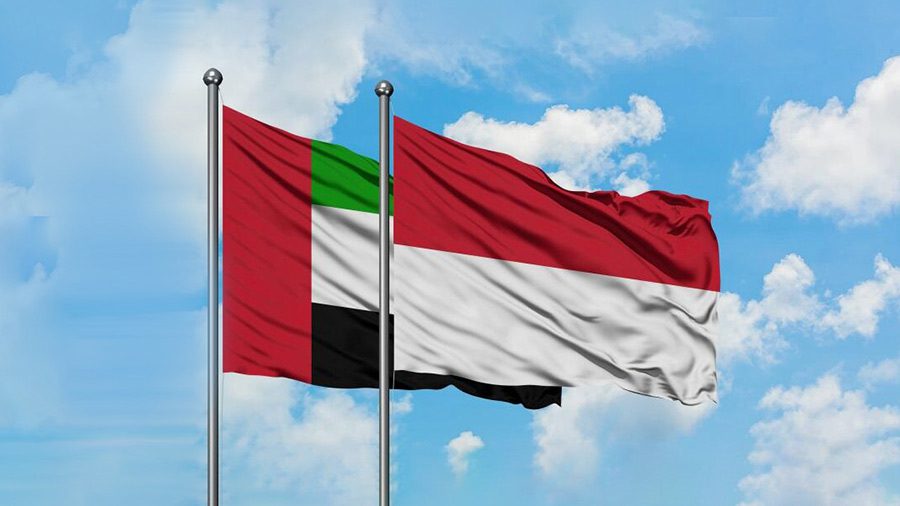
The economic relations between the United Arab Emirates (UAE) and Indonesia have been flourishing in recent years, showcasing a robust partnership. This article delves into the various aspects of this growing relationship, including trade, investments, and the recently signed UAE-Indonesia Comprehensive Economic Partnership Agreement (IUAE-CEPA). As these two nations continue to strengthen their bonds, it becomes crucial to understand the significant developments and opportunities arising from this dynamic partnership.
UAE-Indonesia Economic Relations
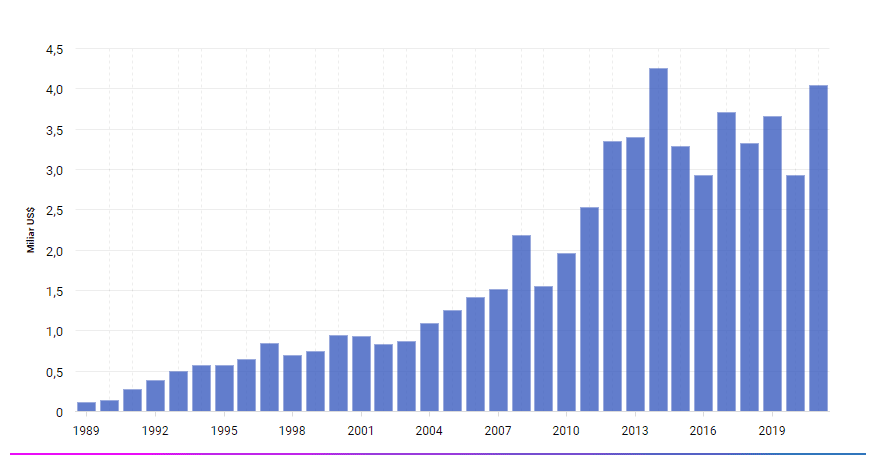
United Arab Emirates (UAE) has always had a sizable economic relation with Indonesia. The trade volume between the two nations experienced a surge of 37.8% in 2021 after the pandemic-induced deficit. After the increase trade reached the value of USD 4 billion, which was the highest in the span of 7 years.
Indonesia’s export to the UAE grew by 52.15% from the previous year in 2021 and reached the value of USD1.89 billion. On the other hand, the imports also grew by 27.33% to USD2.14 billion.
Investment Initiative by UAE in Indonesia
UAE also committed an investment of USD 44.6 billion, which was planned to be realized in 2022-2024. This commitment will be managed by Badan Koordinasi Penanaman Modal (Investment Coordinating Board – BKPM) and Indonesia Investment Authority (INA), worth USD 26.6 billion and USD18 billion respectively.
This investment will be spent on different sectors including air products, chemicals, and the private sector.
Port Investment in Indonesia
Apart from that, UAE is also looking forward to investing in the port sector of Indonesia; for instance, in Belawan New Container Terminal (BNCT) with the corporation of Dubai Port (DP) World and PT. Pertamina. This investment will be valued at USD7.5 billion.
Energy-Related Investment
During the G20 summit, energy companies including Masdar, and the Abu Dhabi National Oil Company (ADNOC) agreed to collaborate with PT. Pertamina. The aim of this collaboration is to develop a solar power plant in Rokan Block. The project will start in November 2024, and is expected to last for 2 years.
Trade Relation Between UAE and Indonesia
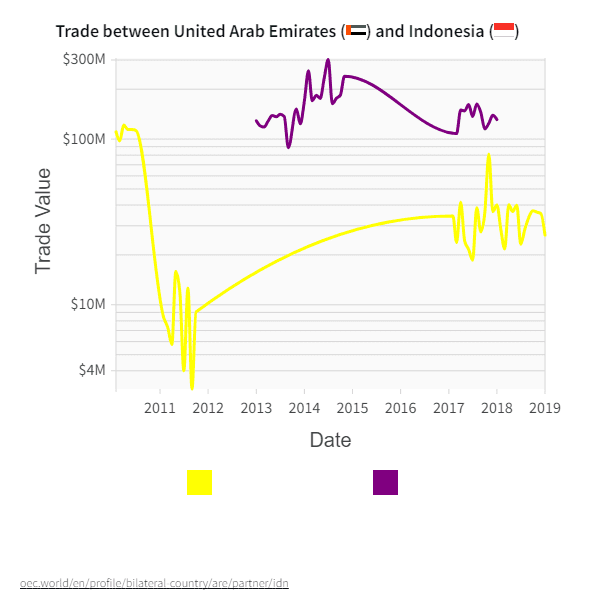
Some of the bilateral trade details between the two countries are as follows:
United Arab Emirates to Indonesia
The UAE exports to Indonesia were recorded at USD 2.13 billion. The most exported products were Petroleum Gas (USD 704M), Refined Petroleum (USD 559M), and Semi-Finished Iron (USD 185M). For the time frame of last 26 years the UAE exports to Indonesia has increased at annual rate of 15.4%.
Indonesia to United Arab Emirates
Indonesia exports were worth USD2.16 billion to UAE in 2021. Some of the main products were Jewelry (USD 345M), Palm Oil (USD 241M), and Cars (USD 206M). During the last 26 years, the exports of Indonesia to the UAE increased at an annual growth rate of 5.64%.
These positive trends in investments and bilateral trade showcases the strength of the ties between the UAE and Indonesia. This has led to the finalization of a deal like the Comprehensive Economic Partnership Agreement (CEPA) between the two nations.
UAE-Indonesia Comprehensive Economic Partnership Agreement (CEPA)
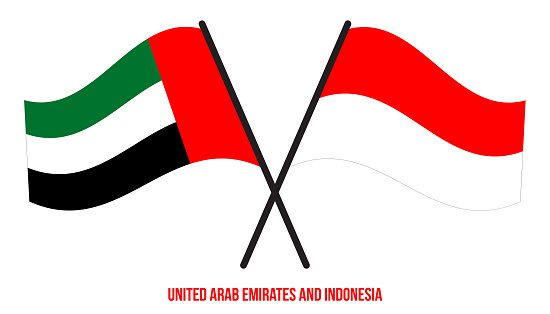
UAE and Indonesia signed a Free Trade Agreement in July 2022 in Abu Dhabi, in the presence of President Sheikh Muhammad Bin Zayed (UAE) and President Joko Widodo (Indonesia) named as UAE-Indonesia Comprehensive Economic Partnership Agreement (IUAE-CEPA).
This agreement will help to remove trade barriers from several goods and services, which will help to boost the bilateral trade to USD 10 billion by 2030.
Coverage of the Agreement
Several sectors in both countries will enjoy reduced or elimination of trade tariffs. According to the deal, UAE will have more than 80% duty-free access to Indonesian palm oil, fashion wear, food products, and other goods.
Both countries are also expected to increase cooperation and investment in agriculture, infrastructure, logistics, energy, tourism, and healthcare. Furthermore, both countries will also boost their cooperation in emerging sectors like Islamic finance, renewable energy, automation, and digital economy.
Some MoUs and protocols were also signed in the same meeting, which includes:
- Cooperation protocol in the Defense Sector.
- MoU between UAE’s Ministry of Health and Prevention and Indonesia’s National Agency Drug and Food Control to enhance partnership in vaccine and drug monitoring.
- Implementation of a joint project between Ministry of Climate Change and Environment of UAE and Coordinating Ministry of Maritime and Investment Affairs of Indonesia that will aim to improve the increasing mangroves.
- A contract between UAE’s Tawazun Economic Council and Indonesia’s PT PAL, a state-owned company, to purchase a landing platform that manufactures ships for both civilian and military use.
Benefits of IUAE-CEPA
This agreement comes with quite a few benefits, including
- Open market access and more opportunities to the UAE by reducing or eliminating import duty rates on around 94% of total tariff items.
- The agreement is expected to generate more than 55,000 job opportunities in the UAE, encouraging foreign direct investment and improving access to Asian market.
- The agreement will help create a trade surplus, the exports to Indonesia expected to be valued at USD 2.1 billion and imports at USD 1.9 billion.
- Easy access to import Indonesian palm oil, fashion, food products, and other commodities.
- Spur more investment in emerging sectors, including tourism, Islamic finance, environmental conservation, construction, energy, and advanced technology.
Top Import and Export of Indonesia
Indonesia’s top exports are coal briquettes, petroleum gas, large flat-rolled stainless steel, and palm oil, mostly to China, United States, Singapore, Japan, and India.
Whereas the top imports are from China, Malaysia, United States, China and Singapore. The list of top imports includes crude petroleum, vaccines, refined petroleum, petroleum gas, motor vehicles, and parts and accessories.
Banned Products
Several products are banned in Indonesia due to health and safety regulations, such as certain food, hazardous material, and medicines. Food items that contain pork or alcohol content are strictly prohibited. Furthermore, pharmaceutical products and hazardous chemicals must be approved by the Ministry of Health and fulfill the required safety standards.
Why Invest in Indonesia?
Over the past few years, Indonesia has emerged as vibrant democracy and the most dynamic economy in Southeast Asia. Due this reason, investing in Indonesia comes with the plethora of perks.
Sound Economy
The promising economic policies of Indonesia has contributed to growing the investment in the country to the five-year high in 2019. Between the years 2000-2010, the economy of Indonesia has grown by 5.2%. The economy also accelerated by 5.1% in 2022. According to the World Bank, Indonesia will be one of the 6 countries that will account for more than half of all-global growth by 2022, others being China, India, Russia, Brazil, and South Korea.
Vast Domestic Market and Increasing Middle Class
Indonesia’s middle class has been significantly increasing; around 52 million or one in five Indonesian is financially secure. The expansion in this group help Indonesia to unlock new developmental potential. The middle class in the country is expected to increase and reach 90 million by 2030 that will help generate an additional USD 1.1 trillion in business opportunities.
Better Access to RCEP
In August 2022, the parliament of the country approved its membership in Regional Comprehensive Economic Partnership (RCEP) trade pact. The RCEP is projected to cover 30% of the global GDP of USD 25.8 trillion.
This trade pact specially offers ample opportunities for the investors in the UAE, since Indonesia is looking to improve the integration into regional value chains and attract more investments.
Financial Technology
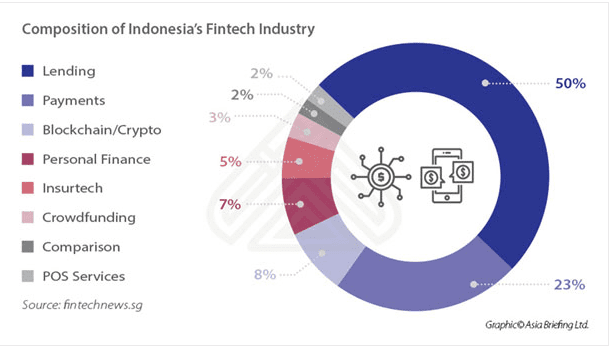
The country’s fintech industry is one of the most promising and dynamic in the ASEAN region. This is evident by the emergence of four unicorns and one decacorn in the country. Indonesia is home to 20% of all the fintech companies in the Southeast Asia bloc that is predicted to generate USD 8.6 billion in revenues in the coming five years.
Digital Economy
Digital technology will play a crucial role in reforming Indonesia’s sectors, such as manufacturing, and healthcare. In research conducted by Google in 2020, the digital economy in Indonesia is expected to reach USD 124 billion by 2025, mainly due to online travel, e-commerce, ride hailing, and online media.
ASEAN-6’s Value of Internet Economy
Country | 2020 | 2025 |
Indonesia | 44 | 124 |
Malaysia | 11.4 | 30 |
Philippines | 7.5 | 28 |
Singapore | 9 | 22 |
Thailand | 18 | 53 |
Vietnam | 14 | 52 |
Documents and Customs Clearance Process for Shipments to Indonesia
It is important to be aware of the customs clearance regulations before shipping cargo to Indonesia. The following documents are made mandatory by the local customs:
- Packing list
- Commercial invoice
- Certificate of origin
- Bill of lading
If you are interested in investing or trading in Indonesia, here’s a list of major seaports, airports, and shipping transportation routes used for sending cargo from the UAE to Indonesia.
Major Seaports and Airports in UAE
The list of major seaports and airports in the UAE include:
Sea Ports in the UAE
Jebel Ali Port
This port is considered to be the most technologically advanced in the UAE with an annual container capacity of 19.3 million TEUs. The port facilitates the shipment of general cargo as well as temperature-sensitive commodities.
Abu Dhabi Port
It is a medium sized commercial deep-water port located on the center of the Gulf Coast of the UAE. This port can process around 8.6 million tons of cargo on an annual basis and has the capability of storing 15,000 TEUs of containerized cargo at once. The type of cargo generally handled at this port includes containerized, general cargo, and bulk.
Port of Sharjah
It is a manmade port that has the capacity of handling 2,090 TEU of cargo, and is known for facilitating dry and liquid bulk, break bulk, passenger vessels, RoRo, and containers.
Port Khalifa
This is one of the world’s largest deepwater ports with a handling capacity of 14.5 million TEUs. The port’s facility is capable of handling containers, RoRo, gas, liquid, dry bulk, and general cargo.
Airports in the UAE
Al Makhtoum International Airport
The airport started the cargo flights in 2010 and now has 16 dedicated cargo terminals. The airport is a main aviation hub with a capacity of 12m metric ton.
Abu Dhabi International Airport
Abu Dhabi International Airport (AUH) is the second largest airport in the world that is known to process over 13 million kg of cargo on a weekly basis. This airport serves hundreds of destinations across 56 countries.
Sharjah International Airport
The Sharjah International Airport (SHJ) has five dedicated cargo terminals. The airport is designed to handle all kinds of livestock and temperature-sensitive products along with general cargo.
Dubai International Airport
Dubai International Airport (DXB) is one of the busiest airports in the world with a capacity of processing over 3.3 million tons of cargo on an annual basis. The airport has a specialized center for flowers and plants and the capability of handling advanced cargo.
Major Seaports and Airports in Indonesia
The list of major seaports and airports in the UAE include:
Sea Ports in Indonesia
Port of Jakarta
The port of Jakarta is the principal port of the country that can handle 45 million tons of cargo and approximately 8 million TEUs. It has a total of 20 terminals, which can accommodate liquid bulk, general cargo, containers, dry bulk, etc.
Port of Belawan
It is one of the busiest facilities in the country outside of Java. On an annual basis, the port processes 2000 vessels, 410,000 TEUs and 12,000,000 tons of cargo. Furthermore, the port handles bulk and oil exports, and general cargo, in addition to exports of palm oil, rubber, tea, coffee, tobacco, and forest products.
Port of Surabaya
The port of Surabaya is known to be a gateway to the eastern Indonesia. The container yard of the port covers an area of 35 hectares and has a capacity of 30,000 TEUs.
Airports in Indonesia
Soekarno-Hatta International Airport
The airport is located in the town of Tangerang, which is 30 km west of Jakarta. The airport has the capacity of handling approximately 1.5 million tons of cargo annually. In 2022, the air cargo traffic for the airport was recorded at 0.953 million tons.
Sultan Syarif Kasim Li Airport
The Sultan Syarif Kasim Li Airport is located in Pekan Baru, Riau, Sumatra. The total capacity of this airport is around 45 T for cargo. It specializes in chartered cargo aircraft.
Juanda International Airport
The airport is located in Sidoarjo, 20km south of Surabaya. It has the capacity of accommodating 120,000 tons of cargo per year.
Shipping Routes to Indonesia
Cargo can be sent from UAE to Indonesia through the following shipping routes:
By Air
Following air routes are available for sending cargo from UAE to Indonesia:
Al Makhtoum International Airport (DWC) to Soekarno-Hatta International Airport (CGK)
This is the quickest air route for sending cargo to Indonesia from the UAE. The transit time takes around 8 hours. Multiple carriers are operating on this trade route; the details are as follows:
Carriers | Departures |
Cargolux | Every1-2 weeks |
Emirates | 1-2 times a day |
Qatar Airways | 2-4 times a week |
Dubai International Airport (DXB) to Soekarno-Hatta International Airport (CGK)
This is one of the most frequently used air routes for cargo shipment. The total transit time for this route is 8 hours and 21 minutes. The details of the carriers operating here includes:
Carriers | Departures |
Emirates | 1-2 times a day |
SriLankan Airlines | 1-2 times a week |
Oman Air | Every 4-6 weeks |
IndiGo | Every 1-2 days |
Qatar Airways | Every 4-6 weeks |
Royal Brunei Airlines | 2-4 times a week |
Saudia | Every 1-2 weeks |
Uzbekistan Airways | Every 1-2 weeks |
China Southern Airways | Daily |
Abu Dhabi International Airport (AUH) to Soekarno-Hatta International Airport (CGK)
This shipment route has a transit time of 8 hours 28 minutes. Several carriers are operating on this route, offering departures every 1-2 days.
Dubai International Airport (DXB) to Sultan Syarif Kasim Li Airport (CGK)
One of the other methods to send shipments from UAE to Indonesia is by loading the cargo from Dubai International Airport and unload it in Sultan Syarif Kasim Li Airport to set it on the journey to Padangsidempuan in Indonesia. The total transit time required for this route is 7 days that includes loading and unloading time at origin and destination, along with time spent in terminal handling.
Sharjah International Airport (SHJ) to Soekarno-Hatta International Airport (CGK)
Sending cargo through this route takes around 1 day and 16 hours with 1 transfer throughout the shipment. Multiple carriers are operating on this route including Singapore Airlines that departures every 1-2 times a day and Cargolux that departures every 1-2 weeks.
By Ocean
For ocean freight, following routes can be utilized:
Abu Dhabi Port (AEAUH) to Jakarta Port (IDJKT)
This is one of the quickest ocean routes to send cargo from UAE to Indonesia. It takes about 14 days and 13 hours to complete the shipment. Multiple carriers are operating on this route, the details are as follows:
Carriers | Departure |
COSCO | Every 1-2 weeks |
OOCL | Every 2-4 weeks |
HMM | Every 2-4 weeks |
Hapag-Lloyd | Every 2-4 weeks |
Abu Dhabi Port (AEAUH) to Jakarta Port (IDJKT) Jebel Ali Port (AEJEA) to Jakarta Port (IDJKT)
This is the most frequently used port for UAE to Indonesia shipments. The transit time for this route is approximately 16 days and 16 hours. The details of the carriers that are operating on this route include:
Carriers | Departure |
ONE | Every 2-4 weeks |
MSC | Every 2-4 weeks |
COSCO | Every 1-2 weeks |
King Ocean | Every 1-2 weeks |
HMM | Every 2-4 weeks |
Hapag-Lloyd | Every 2-4 weeks |
CMA CGM | Every 2-4 weeks |
RCL | Every 2-4 weeks |
Wan Hai | Every 2-4 weeks |
China United | Every 2-4 weeks |
Abu Dhabi Port (AEAUH) to Surabaya Port (IDSUB)
The shipment through this route has a total transit time of 15 days and 3 hours with one transfer in Singapore Port (SGSIN). Multiple carriers operate on this route with departures 2-4 times a week.
Abu Dhabi Port (AEAUH) to Belawan Port (IDBLW)
Another transport route is from Jebel Ali Port to Belawan Port, from there the cargo can be sent to the final destination by road. The total transit time for this shipment is 25 days, which includes loading and unloading at the port, as well as terminal handling.
Jebel Ali (AEJEA) to Surabaya Port (IDSUB)
The other trade route to complete the shipment between the two countries starts from the port of Jebel Ali to Surabaya. The approximate transit time for this transport route is 21 days.
Conclusion
In conclusion, the UAE-Indonesia economic relations have witnessed remarkable growth, marked by increased trade volumes, substantial investments, and the signing of the IUAE-CEPA. Both nations stand to benefit from this deepened partnership, with opportunities spanning various sectors such as agriculture, infrastructure, tourism, and digital economy. As Indonesia’s dynamic economy and strategic location in Southeast Asia continue to attract global attention, the UAE’s commitment to investing in and fostering closer ties with Indonesia positions them for mutual success in the years to come. This partnership not only opens doors to new economic horizons but also reflects the shared commitment to promoting prosperity and cooperation on the international stage.
Related Articles
Exploring the Booming UAE-Indonesia Economic Relations
The economic relations between the United Arab Emirates (UAE) and Indonesia have been flourishing in
Comprehensive Guide on USA-UAE Economic Relationship
Introduction The United Arab Emirates (UAE) has been a central player in the realm of international
The UAE and Saudi Arabia – Economic Powerhouses on the Rise
The bilateral trade relationship between the United Arab Emirates (UAE) and Saudi Arabia is characte




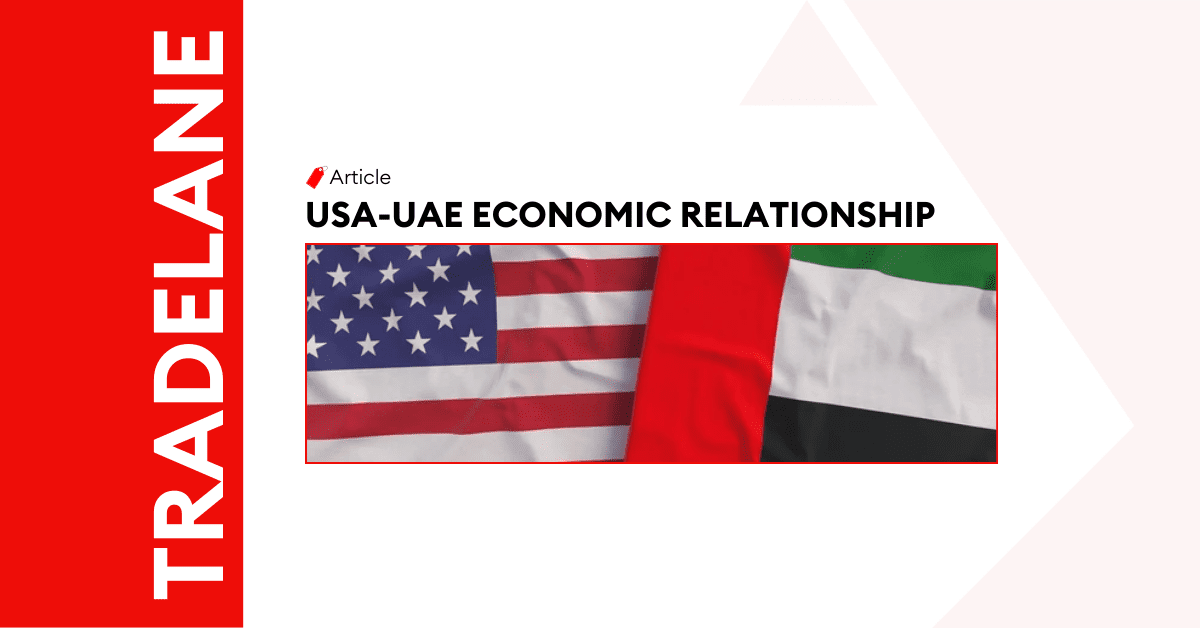
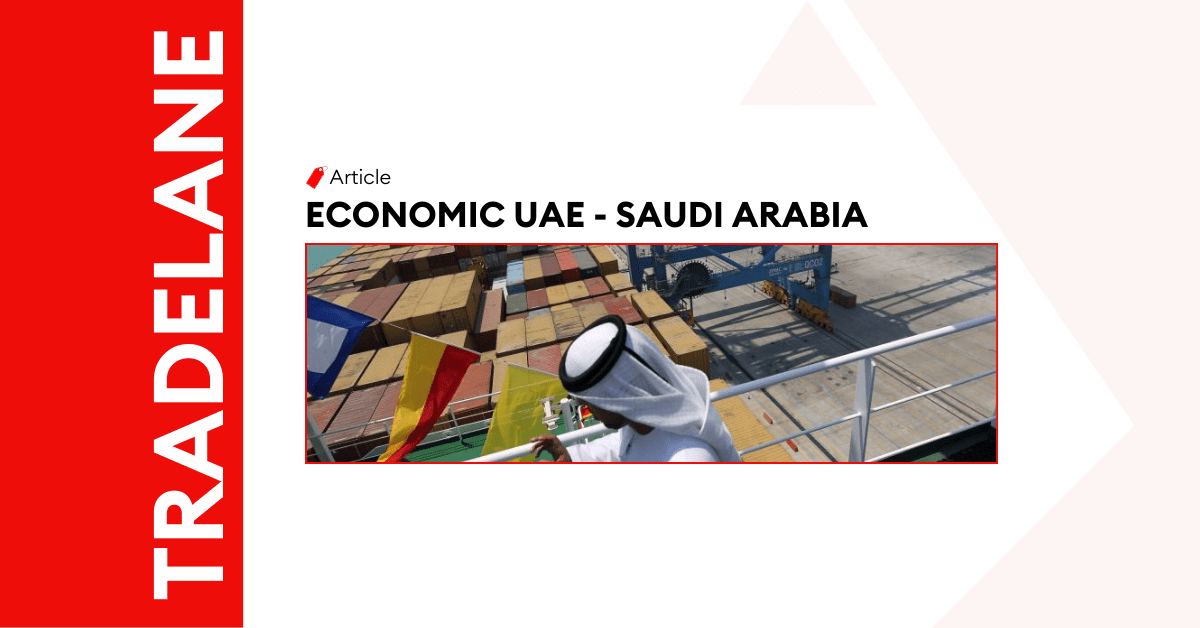
Post a comment
You must be logged in to post a comment.